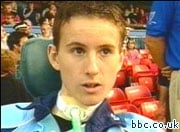“True courage.” That is how a newspaper commentator has described Matt King, a 23-year-old rugby fan who is paralysed but now says he enjoys his life and hopes he has “a lot to give”.
Mr King broke his neck in a rugby game in 2004 and now needs 24-hour care.
When the accident happened he says he was terrified and remembers saying: “Just let me die”.
Solicitor
But, although there were hard times, he decided he was not going to give up: “It would have been wrong for me to give up if all these people hadn’t given up on me.”
And he says, “the life I lead now is never one I would have chosen, but it is still a good life. I still enjoy it. I hope I’ve got a lot to give”.
Columnist Tanya Aldred was writing in The Daily Telegraph after receiving a Christmas card from Mr King, which he had painted himself with a mouthpiece.
Mr King has completed the New York marathon, works as a volunteer, has gained a rugby coaching certificate, and is in the middle of his solicitor training.
Courage
He says: “I am what I am now. I’m still Matt, but I’m in a chair.”
Tanya Aldred ends her article by commenting: “He says he is not brave, nothing special, just gets on with it. I say this is true courage.”
“You just don’t know what will happen”
In his book Against Physician Assisted Suicide, Dr David Jeffrey tells the story of a former army instructor who was being treated for terminal cancer and was determined to commit suicide.
After a discussion with the doctor, it emerged that he was missing the Army, and was subsequently taken to watch a passing-out parade of young recruits, where a party had been arranged in his honour.
“His life was transformed,” Dr Jeffrey said. “He had a purpose and his demeanour completely changed. He died two weeks later, comfortably. People’s lives always have that potential. Even in the midst of suffering there can be change.
“You just don’t know what will happen.”
“A different life”
The Times reported the story of Matt Hampson, a former rugby player who was paralysed from the neck down during training and now requires a ventilator to breathe.
With the help of carers and a custom-built house, he has been able to set up a website and is the patron of a charity for disabled children called Special Effects.
He says: “I don’t live a bad life, I live a different life. I use my brain more than my brawn now. It has helped me become a more rounded person. I think about things more.
“I’ve had to grow up quite a bit and do things that most 23-year-olds don’t do.”
“I’m grateful I wasn’t allowed to end it all!”
Alison Davis is National Co-ordinator of No Less Human. She was born with severe spina bifida, and is dependent on a wheelchair. She is often in extreme pain for hours at a time. She says that for many years she wanted to “end it all”.
“If euthanasia had been legal, I would certainly have requested it and I wouldn’t be here now,” she says.
But after several serious suicide attempts, blocked by the intervention of Alison’s friends, she began to change her mind.
Alison met the disabled children she had been sponsoring through a charity. The experience led her to think, for the first time in over ten years, “I think I want to live”.
She says: “I’ll always be grateful to the friends who saved my life (though I wasn’t at the time). And I’m especially thankful there was no possibility of persuading my doctors to legally help me die.”
She believes that disabled people “deserve the same kind of help routinely given to those who do not have a physical condition but who feel suicidal”.


